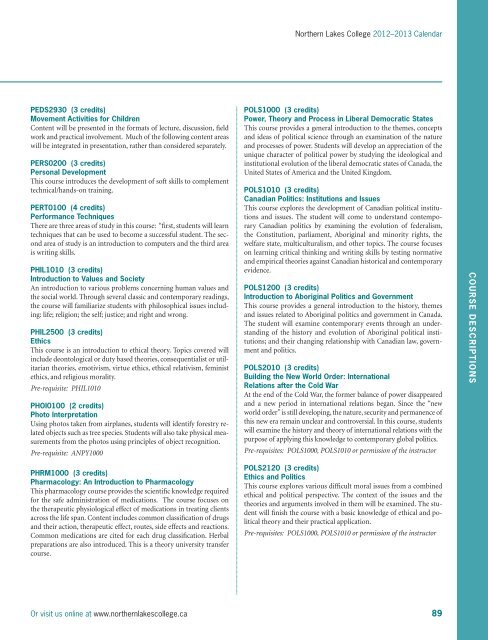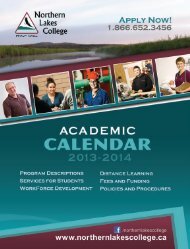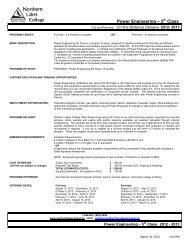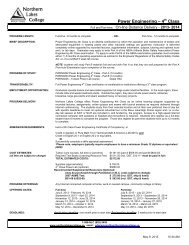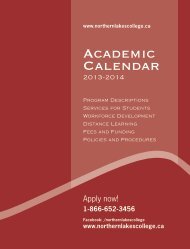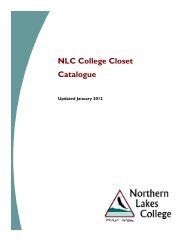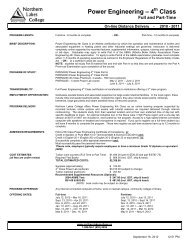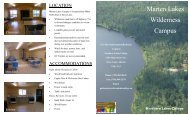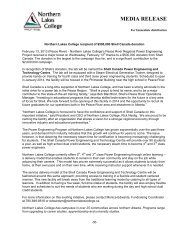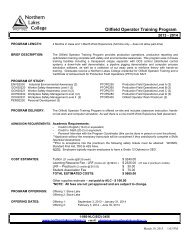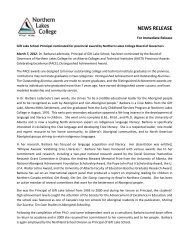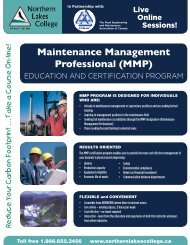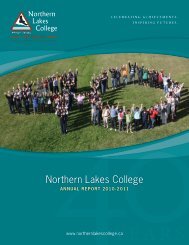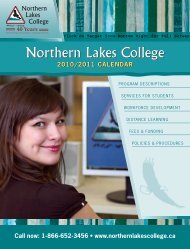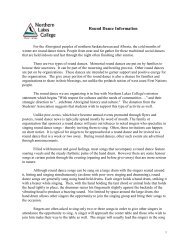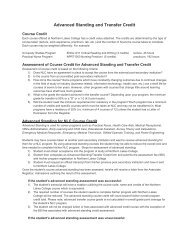NLC Calendar - Northern Lakes College
NLC Calendar - Northern Lakes College
NLC Calendar - Northern Lakes College
You also want an ePaper? Increase the reach of your titles
YUMPU automatically turns print PDFs into web optimized ePapers that Google loves.
<strong>Northern</strong> <strong>Lakes</strong> <strong>College</strong> 2012–2013 <strong>Calendar</strong><br />
PEDS2930 (3 credits)<br />
Movement Activities for Children<br />
Content will be presented in the formats of lecture, discussion, field<br />
work and practical involvement. Much of the following content areas<br />
will be integrated in presentation, rather than considered separately.<br />
PERS0200 (3 credits)<br />
Personal Development<br />
This course introduces the development of soft skills to complement<br />
technical/hands-on training.<br />
PERT0100 (4 credits)<br />
Performance Techniques<br />
There are three areas of study in this course: “first, students will learn<br />
techniques that can be used to become a successful student. The second<br />
area of study is an introduction to computers and the third area<br />
is writing skills.<br />
PHIL1010 (3 credits)<br />
Introduction to Values and Society<br />
An introduction to various problems concerning human values and<br />
the social world. Through several classic and contemporary readings,<br />
the course will familiarize students with philosophical issues including:<br />
life; religion; the self; justice; and right and wrong.<br />
PHIL2500 (3 credits)<br />
Ethics<br />
This course is an introduction to ethical theory. Topics covered will<br />
include deontological or duty based theories, consequentialist or utilitarian<br />
theories, emotivism, virtue ethics, ethical relativism, feminist<br />
ethics, and religious morality.<br />
Pre-requisite: PHIL1010<br />
PHOI0100 (2 credits)<br />
Photo Interpretation<br />
Using photos taken from airplanes, students will identify forestry related<br />
objects such as tree species. Students will also take physical measurements<br />
from the photos using principles of object recognition.<br />
Pre-requisite: ANPY1000<br />
POLS1000 (3 credits)<br />
Power, Theory and Process in Liberal Democratic States<br />
This course provides a general introduction to the themes, concepts<br />
and ideas of political science through an examination of the nature<br />
and processes of power. Students will develop an appreciation of the<br />
unique character of political power by studying the ideological and<br />
institutional evolution of the liberal democratic states of Canada, the<br />
United States of America and the United Kingdom.<br />
POLS1010 (3 credits)<br />
Canadian Politics: Institutions and Issues<br />
This course explores the development of Canadian political institutions<br />
and issues. The student will come to understand contemporary<br />
Canadian politics by examining the evolution of federalism,<br />
the Constitution, parliament, Aboriginal and minority rights, the<br />
welfare state, multiculturalism, and other topics. The course focuses<br />
on learning critical thinking and writing skills by testing normative<br />
and empirical theories against Canadian historical and contemporary<br />
evidence.<br />
POLS1200 (3 credits)<br />
Introduction to Aboriginal Politics and Government<br />
This course provides a general introduction to the history, themes<br />
and issues related to Aboriginal politics and government in Canada.<br />
The student will examine contemporary events through an understanding<br />
of the history and evolution of Aboriginal political institutions;<br />
and their changing relationship with Canadian law, government<br />
and politics.<br />
POLS2010 (3 credits)<br />
Building the New World Order: International<br />
Relations after the Cold War<br />
At the end of the Cold War, the former balance of power disappeared<br />
and a new period in international relations began. Since the “new<br />
world order” is still developing, the nature, security and permanence of<br />
this new era remain unclear and controversial. In this course, students<br />
will examine the history and theory of international relations with the<br />
purpose of applying this knowledge to contemporary global politics.<br />
Pre-requisites: POLS1000, POLS1010 or permission of the instructor<br />
course descriptions<br />
PHRM1000 (3 credits)<br />
Pharmacology: An Introduction to Pharmacology<br />
This pharmacology course provides the scientific knowledge required<br />
for the safe administration of medications. The course focuses on<br />
the therapeutic physiological effect of medications in treating clients<br />
across the life span. Content includes common classification of drugs<br />
and their action, therapeutic effect, routes, side effects and reactions.<br />
Common medications are cited for each drug classification. Herbal<br />
preparations are also introduced. This is a theory university transfer<br />
course.<br />
POLS2120 (3 credits)<br />
Ethics and Politics<br />
This course explores various difficult moral issues from a combined<br />
ethical and political perspective. The context of the issues and the<br />
theories and arguments involved in them will be examined. The student<br />
will finish the course with a basic knowledge of ethical and political<br />
theory and their practical application.<br />
Pre-requisites: POLS1000, POLS1010 or permission of the instructor<br />
Or visit us online at www.northernlakescollege.ca<br />
89


